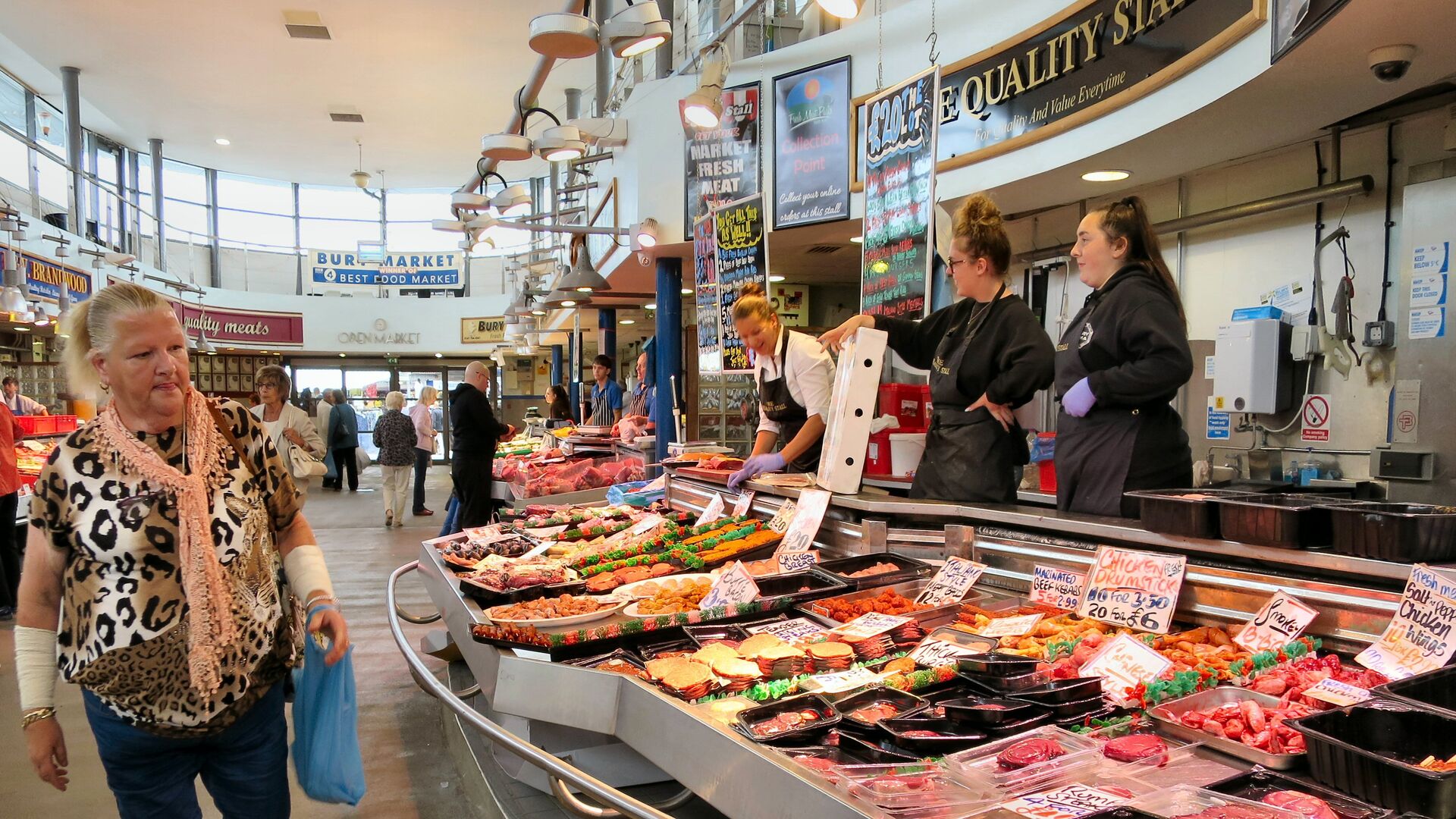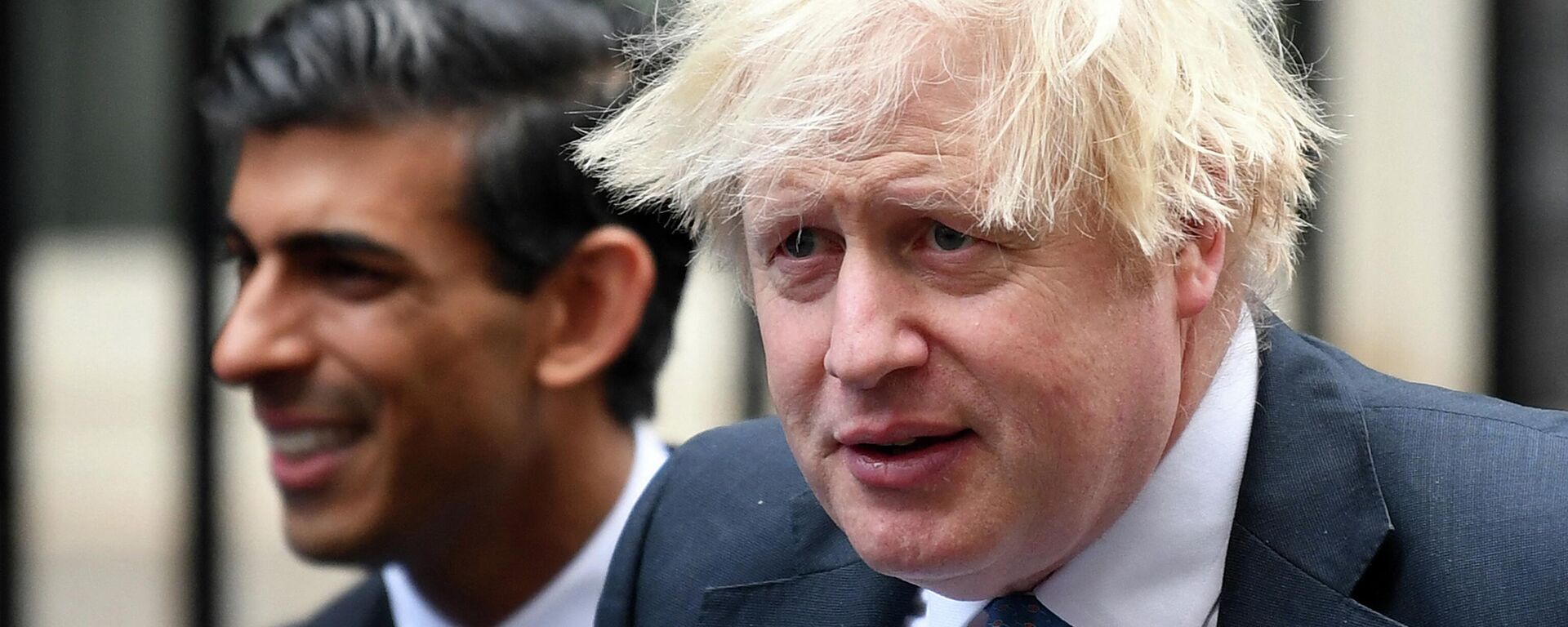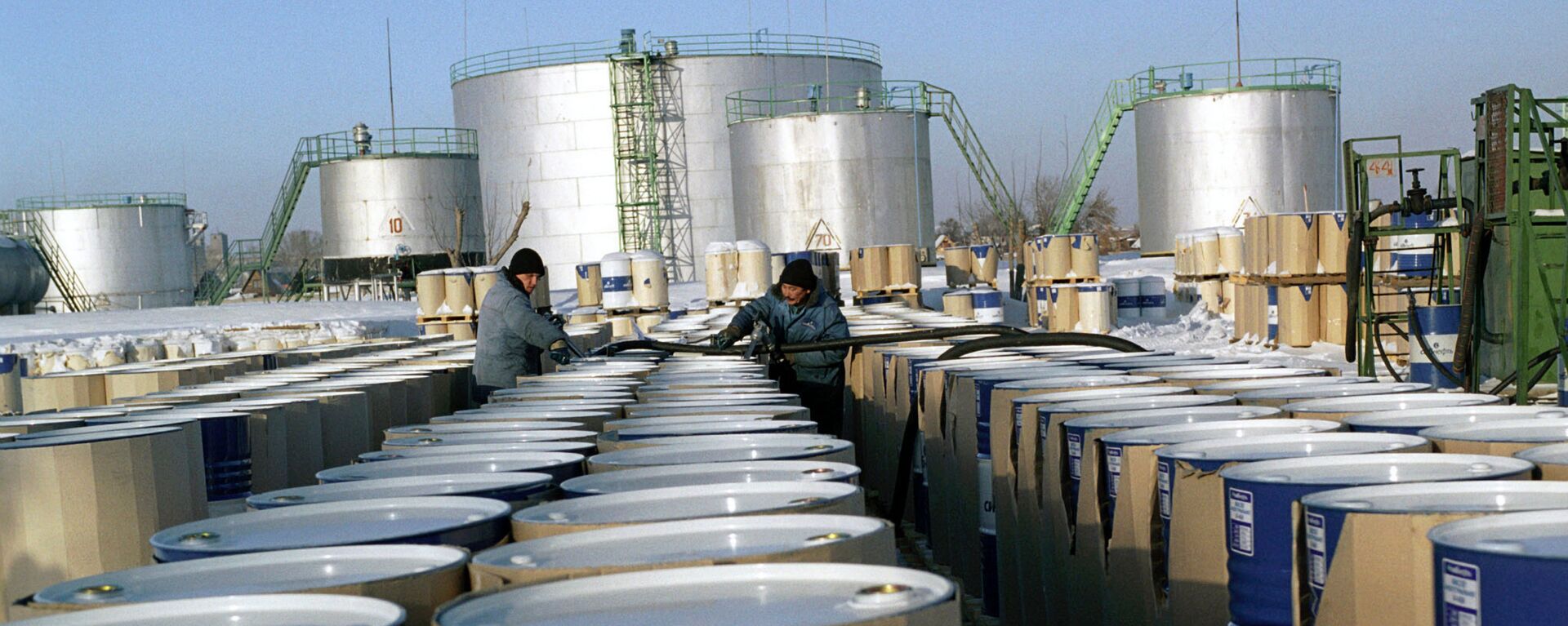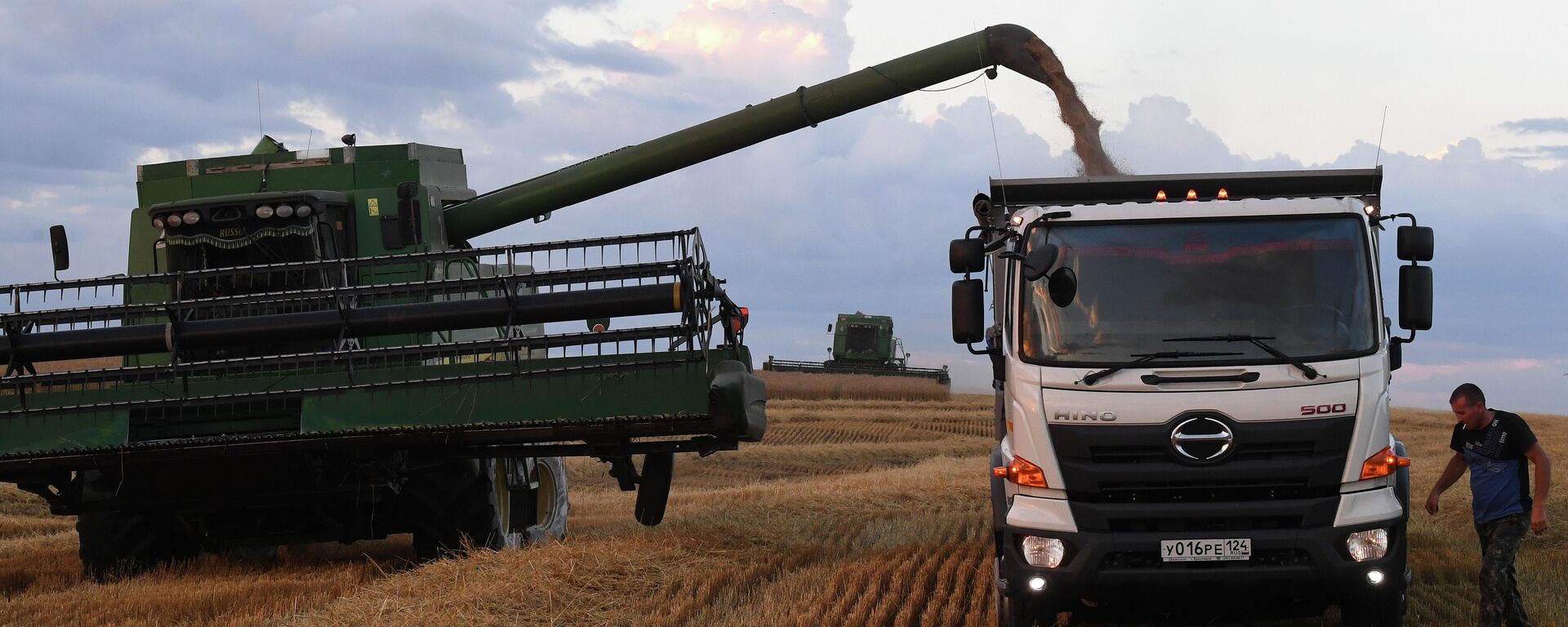https://sputnikglobe.com/20220517/uk-faces-very-big-income-shock-amid-apocalyptic-global-food-price-rise-warns-bank-of-england-1095560755.html
UK Faces ‘Very Big Income Shock’ Amid ‘Apocalyptic’ Global Food-Price Rise, Warns Bank of England
UK Faces ‘Very Big Income Shock’ Amid ‘Apocalyptic’ Global Food-Price Rise, Warns Bank of England
Sputnik International
An escalating cost-of-living crisis has started to take its toll on consumers across the UK, with rising inflation driven by record energy prices... 17.05.2022, Sputnik International
2022-05-17T06:05+0000
2022-05-17T06:05+0000
2023-05-28T15:19+0000
andrew bailey
bank of england
inflation
ukraine crisis
united kingdom (uk)
https://cdn1.img.sputnikglobe.com/img/107297/88/1072978884_0:0:3655:2057_1920x0_80_0_0_cad17c934816f5a99f88905bcee52df2.jpg
With the Bank of England expecting surging inflation to hit 10 percent by the end of 2022, its governor, Andrew Bailey has warned that UK households face a “very big income shock”.The governor was giving evidence to the Treasury Select Committee amid criticism from senior Tories about his response to growing prices driven by inflation surging well past the government’s target of 2 percent.As Bailey told MPs that the potential for further food inflation was a “major worry for his country and a major worry for the developing world,” he brushed off accusations from the Committee chairman, Mel Stride, that his Bank had been "slow off the mark" to raise interest rates.The Bank of England's target is to get inflation to 2 percent on the Consumer Price Index. However, official figures expected on Wednesday are to show the annual inflation rate climbing above 9 percent, with the Bank of England warning of a further rise once the energy price cap is raised again in October.At its meeting ending on 15 December 2021, the MPC voted by a majority of 8-1 to increase Bank Rate by 0.15 percentage points, to 0.25 percent.Facing parliamentarians, Bailey blamed a plethora of global factors for contributing to the escalating cost of living crisis. He insisted that 80 percent of them were out of his control and could not have been foreseen by rate-setters at the bank.He cited post-pandemic supply chain disruptions and labour shortages, but conceded the Bank had underestimated the number of people who would leave the labour market after the threat of COVID-19 had receded. He also emphasised trade frictions with Europe after Brexit, saying there has been no evidence to change the Bank's opinion that the divorce from the EU would be bad for the UK's trade."We have built into our view of the future that there is a negative impact," said Bailey. He then addressed the crisis in Ukraine.As world wheat prices and UK diesel and petrol prices come close to reaching record levels, Bailey admitted the the impact of Western sanctions on Russia over its special operation to demilitarise and de-Nazify Ukraine.Several countries have followed Washington and its NATO allies in enacting punitive measures against Moscow, despite the immense damage they cause to their own economies.Besides the sanctions targeting Moscow’s energy imports, Ukraine and Russia represent 53 percent of global trade in sunflower oil and seeds, and 27 percent in wheat, according to the United Nations.At least 20 countries have imposed restrictions on food exports, covering around 17 percent of calories traded globally, according to Bloomberg, “compounding the [food market] problem with protectionism.” Most recently, India invoked a decision to regulate wheat exports, directing them through government channels to tame domestic prices - something that cannot but affect global strains.In parliament, Andrew Bailey also warned that unemployment was set to increase amid the inflation onslaught.According to him, prices would eventually be brought down by a "shock" to real incomes which "will have an effect on domestic demand, and it will damp activity".
https://sputnikglobe.com/20220511/bojos-hints-at-emergency-budget-over-cost-of-living-crisis-were-over-interpreted---michael-gove-1095425553.html
https://sputnikglobe.com/20220504/kremlin-cost-of-sanctions-against-russia-will-increase-for-european-citizens-every-day-1095256772.html
https://sputnikglobe.com/20220515/india-assures-supplies-to-needy-as-g-7-criticises-modis-wheat-exports-ban-1095523239.html
united kingdom (uk)
Sputnik International
feedback@sputniknews.com
+74956456601
MIA „Rossiya Segodnya“
2022
News
en_EN
Sputnik International
feedback@sputniknews.com
+74956456601
MIA „Rossiya Segodnya“
Sputnik International
feedback@sputniknews.com
+74956456601
MIA „Rossiya Segodnya“
andrew bailey, bank of england, inflation, ukraine crisis, united kingdom (uk)
andrew bailey, bank of england, inflation, ukraine crisis, united kingdom (uk)
UK Faces ‘Very Big Income Shock’ Amid ‘Apocalyptic’ Global Food-Price Rise, Warns Bank of England
06:05 GMT 17.05.2022 (Updated: 15:19 GMT 28.05.2023) An escalating cost-of-living crisis has started to take its toll on consumers across the UK, with rising inflation driven by record energy prices, post-COVID-19 pandemic supply chain disruptions and self-inflicted fall-out from the sweeping sanctions western countries have imposed on Russia over its ongoing special operation in Ukraine.
With the Bank of England expecting surging inflation to hit 10 percent by the end of 2022, its governor, Andrew Bailey has warned that
UK households face a “very big income shock”.
"[The inflation risk factor] that I am going to sound rather apocalyptic about is food," Bailey was cited by UK media outlets as saying.
The governor was giving evidence to the Treasury Select Committee amid criticism from senior Tories about his response to growing prices driven by inflation surging well past the government’s
target of 2 percent.
As Bailey told MPs that the potential for further food inflation was a “major worry for his country and a major worry for the developing world,” he brushed off accusations from the Committee chairman, Mel Stride, that his Bank had been "slow off the mark"
to raise interest rates.
The Bank of England's target is to get inflation to 2 percent on the Consumer Price Index. However, official figures expected on Wednesday are to show the annual inflation rate climbing above 9 percent, with the Bank of England warning of a further rise once the energy price cap is raised again in October.
“I don’t feel at all happy and it’s a bad situation to be in,” the governor said after MPs asked him why the Bank had not acted before December to prevent inflation from soaring by raising interest rates.
At its meeting ending on 15 December 2021, the MPC voted by a majority of 8-1 to increase Bank Rate by 0.15 percentage points, to 0.25 percent.
Facing parliamentarians, Bailey blamed a plethora of global factors for contributing to the escalating cost of living crisis. He insisted that 80 percent of them were out of his control and could not have been foreseen by rate-setters at the bank.
He cited post-pandemic supply chain disruptions and labour shortages, but conceded the Bank had underestimated the number of people who would leave the labour market after the threat of COVID-19 had receded. He also emphasised
trade frictions with Europe after Brexit, saying there has been no evidence to change the Bank's opinion that the divorce from the EU would be bad for the UK's trade.
"We have built into our view of the future that there is a negative impact," said Bailey. He then addressed the crisis in Ukraine.
“I don’t think we could foresee a war in Ukraine. Another factor that we’re dealing with at the moment is a further leg of COVID-19, which is affecting China. We have seen a series of supply shocks coming one after another, and that’s unprecedented.”
As world wheat prices and UK diesel and petrol prices come close to reaching record levels, Bailey admitted the the impact of Western sanctions on Russia over its special operation to demilitarise and de-Nazify Ukraine.
Several countries have followed Washington and its NATO allies in enacting punitive measures against Moscow, despite the immense damage they cause to their own economies.
Besides the sanctions targeting Moscow’s energy imports, Ukraine and Russia represent 53 percent of global trade in sunflower oil and seeds, and 27 percent in wheat, according to the United Nations.
At least 20 countries have imposed restrictions on food exports, covering around 17 percent of calories traded globally, according to Bloomberg, “compounding the [food market] problem with protectionism.” Most recently, India invoked a decision
to regulate wheat exports, directing them through government channels to tame domestic prices - something that cannot but affect global strains.
In parliament, Andrew Bailey also warned that unemployment was set to increase amid the inflation onslaught.
According to him, prices would eventually be brought down by a "shock" to real incomes which "will have an effect on domestic demand, and it will damp activity".
"I'm afraid it looks like it will increase unemployment," he added.




